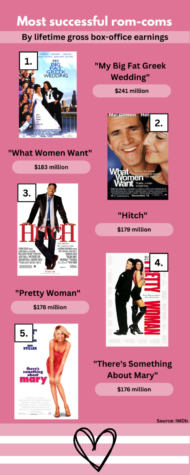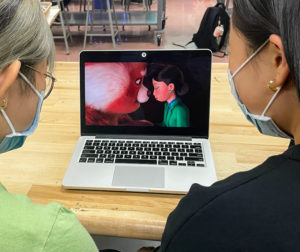Rom-coms deliver uniquely enriching, inspiring viewing experience
Rom-coms don’t receive as much traction as they used to, but they have much to offer in the way of strengthening communication skills, supporting diversity in film and uplifting viewers.
April 13, 2023
Technically speaking, it doesn’t take much to make a romantic comedy. Throw a pair of charismatic, if slightly quirky, protagonists into an awkward but electric setup for a “meet-cute,” and what’s left but to watch the sparks fly?
However, rom-coms have much to offer beyond these basic elements, and it’s essential that society embraces the constructive messaging and feel-good atmosphere espoused by these films now more than ever.
The term “rom-com” is as self-explanatory as it gets, denoting a love story tinged with a distinct sense of lightheartedness and humor. With audiences eager to watch two often diametrically-opposed leads fall in love on-screen, the 1980s and ‘90s saw the release of some of the genre’s biggest hits, including “Pretty Woman” and “The Princess Bride.”
But the popularity of these movies has since declined. According to film data analyst and producer Stephen Follows, both the number of rom-coms produced and the box-office profits yielded by such films have fallen dramatically since the turn of the century—yet their benefits remain numerous.
For one, rom-coms are key to building communication skills. Although an eventual happily-ever-after or otherwise satisfying conclusion is guaranteed for the cinematic couple, the preceding plotline is often peppered with squabbles, situational crises and some form of the third-act misunderstanding to make the victory feel “earned.”

This requires both characters to wield their interpersonal skills extensively, which could mean working through conflicting expectations for a romantic relationship, as is the case for Tom and Summer of “500 Days of Summer,” a doomed couple who nonetheless parts amicably. Alternatively, the couple may have to reckon with the costs of long-term commitment, a dilemma Jesse and Celine of the “Before Trilogy” face several times before settling down together. Whatever the case may be, viewers learn the ins and outs of effective communication, something that will certainly come to their advantage in navigating an increasingly interconnected world.
Rom-coms also provide a powerful platform on which to promote diversity. Hollywood is notorious for its lack of diversity to the point where merely four people of color (POC) are cast for every 10 leading roles in film, per the latest UCLA Hollywood Diversity Report. Although this is an improvement from the abysmal 10.5% of leading roles occupied by POC in 2011, there is evidently a long way to go until minorities receive proportional representation in the industry.
But rom-coms are responsible for much of the headway made in this regard. Some of the genre’s recent smash hits include “Crazy Rich Asians,” which features a predominantly Asian cast, and “The Big Sick,” which follows a white and Pakistani couple facing pushback from their respective families. These films were certainly not the first to break cultural barriers or dispel negative attitudes around interracial relationships, but their success can only bode well for the future of minority actors and stories in film alongside the millions of viewers who hope to see themselves represented on the big screen.
Plus, these cinematic staples exude a sense of joy that cuts through the gloom of this day and age. Not only has social pessimism trended upward in the last decade, but according to the World Health Organization, the coronavirus pandemic has sparked a 25% increase in rates of depression and anxiety. Negative feelings of all kinds abound in modern society.
That’s where rom-coms come in. According to Harvard University, love triggers the release of so-called happiness hormones such as dopamine and oxytocin, making it a distinctly “pleasurable experience.” And given that this emotion is at the heart of every rom-com, it’s not unreasonable to assume that the films, intimate and swoon-worthy as they typically are, induce much the same effect in audiences. Although watching Harry confess his long-standing love for Sally as the clock strikes midnight on New Year’s certainly won’t take care of any major global issues, it may very well impart a sense of hope that makes the stress of day-to-day life manageable.
Despite being pigeonholed as cliché “chick flicks” and subpar snore-fests over the years, there is clearly more to rom-coms than quippy dialogue and sappy scenes; indeed, the possibilities these films provide for both self and societal improvement are nothing short of incredible. So before turning your nose up at “10 Things I Hate About You” or “13 Going on 30,” consider the slew of benefits that remain just a click of the TV remote away. After all, you may just find yourself head over heels for your next watch.






